World Rugby to clamp down on water carriers abusing their position after RFU bans Wasps coaches
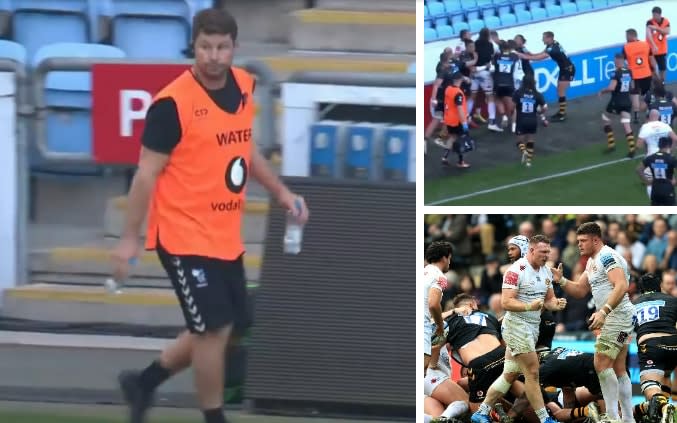
World Rugby intends to launch a clamp down on water carriers abusing their position as the Rugby Football Union banned two Wasps coaches for their conduct in a match against Exeter.
The one-week suspensions handed to Scott Barrow, Wasps’ backs-transition coach, and Pete Atkinson, the club’s performance director, are the first formal punishments handed down by the RFU to water carriers in the elite game. This is just the latest example in a growing trend of players and coaches, doubling as water carriers, taking advantage of their pitchside position, whether by getting involved in matches or intimidating match officials.
World Rugby has been monitoring these developments with concern and it is believed it will instruct referees to enforce a more stringent approach on water carriers pushing the envelope in the autumn internationals. During South Africa’s victory against New Zealand in the Rugby Championship earlier this month, English referee Matthew Carley admonished a Springbok water carrier for haranguing his assistant referee over the awarding of a 50-22.
However, Telegraph Sport understands that World Rugby chairman Bill Beaumont personally believes that the regulations need tightening and the item will be on the agenda at next month’s meeting of the executive committee. At the start of the Covid-19 pandemic, World Rugby gave teams dispensation to have a third water carrier to help mitigate the risk of infection. That will continue through the November internationals but is being reviewed.
The greater problem is how the law has not kept up with how the role has evolved to message carriers. Of particular concern to World Rugby is how the presence of water carriers on the pitch or sidelines is being used to intimidate match officials. Only head coaches are prohibited from being water carriers, but that does not stop Rassie Erasmus, South Africa’s director of rugby, from running water onto the pitch. As Warren Gatland pointed out during the Lions series, sometimes he often forgot that basic duty.
“The thing is if you’re the water boy running onto the pitch, you've got to make sure that you are carrying the water,” Gatland, the Lions head coach, said. “So I didn't quite understand what his role was. You don’t run onto the pitch, carrying messages, without the water.”
The RFU is also aware of the issue and hopes a strong message has been sent with Barrow and Atkinson both being charged with conduct prejudicial to the interests of the union and the game. “The RFU works hard to uphold the values of rugby across all levels of the game in England and collaborates closely with Premiership Rugby and its clubs, with weekly reviews from matches,” a spokesperson said. “Where activity or conduct of individuals or clubs does not meet these values then action will be taken - either on pitch by the match officials team, or off-pitch via a disciplinary process.”
Barrow has been handed a one-week suspension after preventing Exeter Chiefs scrum-half Jack Maunder from getting to a loose ball off the field of play. Barrow was then 'sent off' by referee Wayne Barnes following the incident.
Barrow was captured by BT Sport back heeling the ball through his legs towards the stands and then preventing Maunder from reaching the ball after Exeter had been awarded a penalty and were on the attack five metres from Wasps' line. Barrow's intervention then sparked a touchline brawl, with Exeter lock Jonny Hill confronting Barrow and several players from both sides involved.
Meanwhile,Atkinson has also received a one-week ban for comments made to Barnes following his decision to award a try to Exeter. Both Barrow and Atkinson will now miss this weekend's match for Wasps against Saracens, with the pair unable to attend "in any other capacity than as a spectator”.
Both Barrow and Atkinson will be required to "deliver a presentation to the non-playing members of Wasps staff on the Premiership Regulations (Schedule 2) relating to the operation of technical areas for matches, and also how their own off-field conduct was contrary to the values of the game", according to the disciplinary panel comprising Mike Hamlin (chair) with Gareth Graham and Mitch Read.
Wasps will head to Saracens on Sunday in mid-table after winning two of their opening four matches.
So what exactly happened?
Exeter were awarded a penalty yards short of the Wasps line.
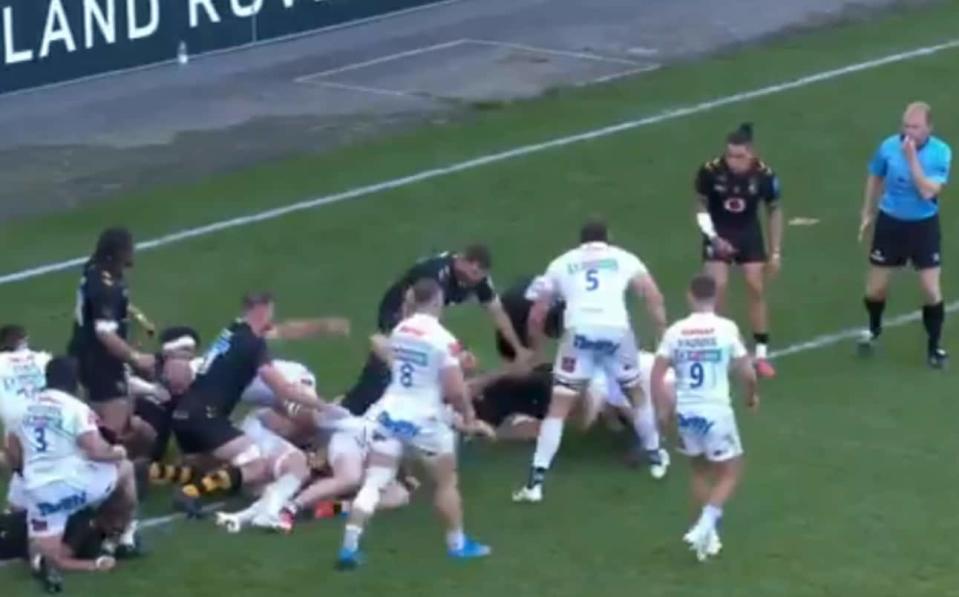
The loose ball was thrown towards the dead-ball line...where Scott Barrow back-heeled it away.
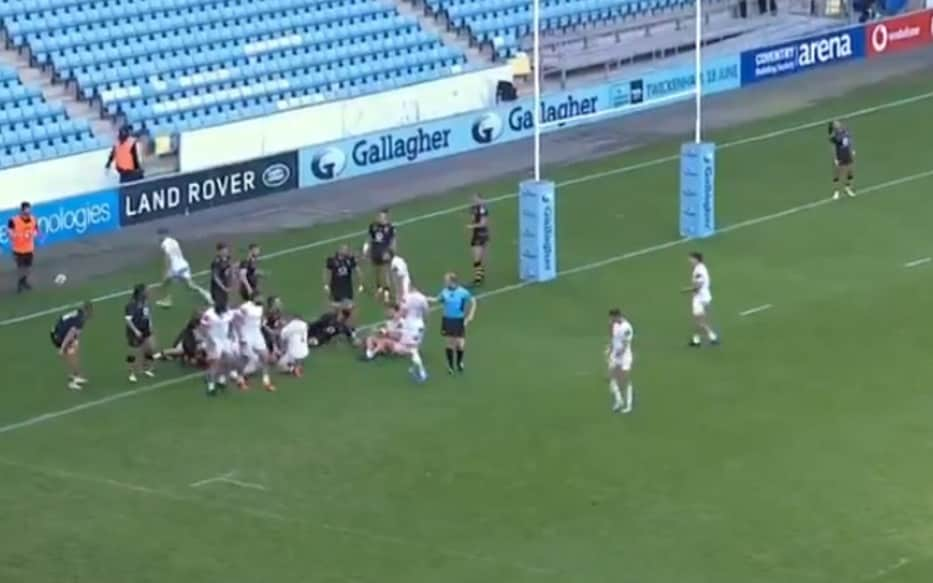
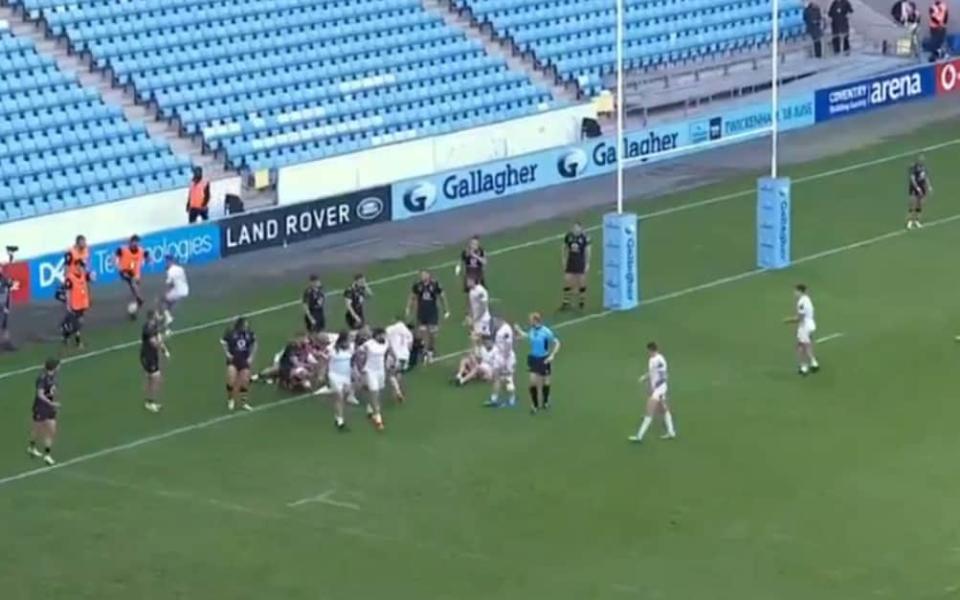
The Exeter players spotted this and were less than impressed, with both sides then piling in.
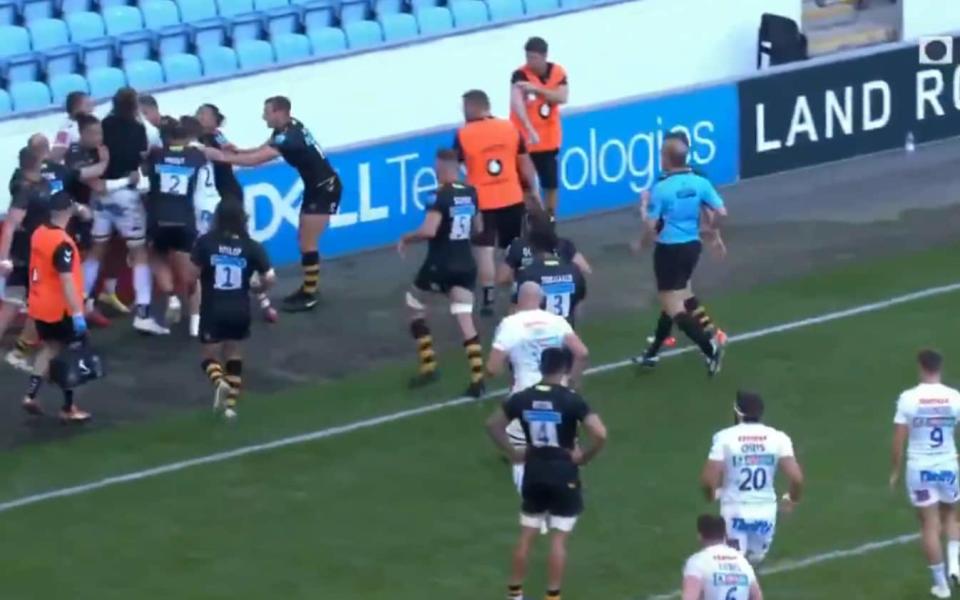
And referee Wayne Barnes gave the Wasps coach his marching orders - cue sheepish look from Barrow.
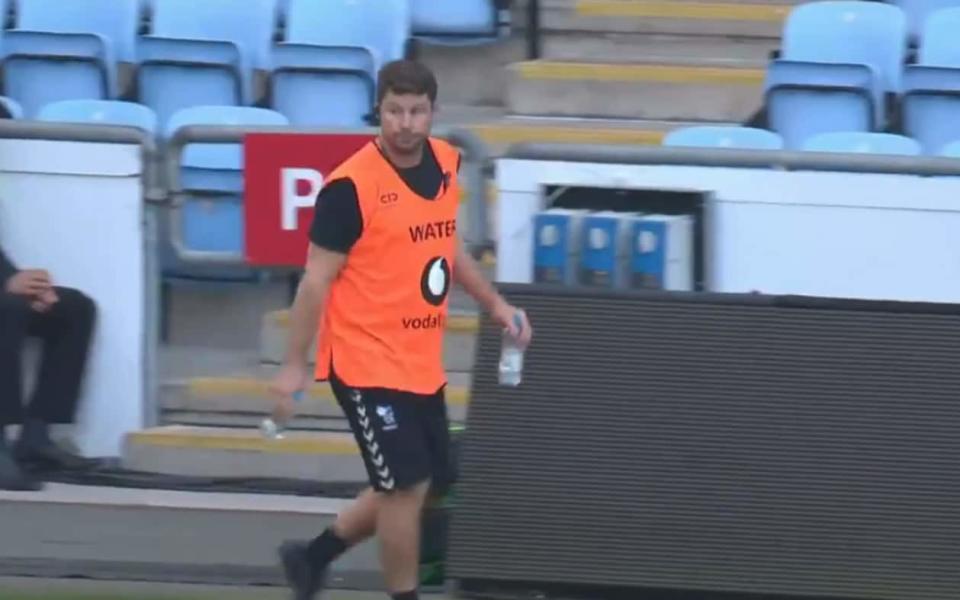
Comment: 'Water carriers' should carry water alone and not instructions
The collective noun for water carriers has yet to be determined but while the doyens at Merriam-Webster ponder this eternal question may I propose a blight of water carriers? Or failing that an irritation of water carriers?
There are countless more pressing issues sitting atop of the to-do lists of rugby’s decision-makers but as personal vexations go the sight of six water boys entering the field of play approximately every 30 seconds is right up there with the public address affliction that is Neil Diamond’s Sweet Caroline. To be clear: players have a right to water. Whether they need it before the first very scrum in a midwinter match is another matter.
Regardless, their designated purpose is not the problem. It is how their role has evolved whereby hydration is merely a cover for relaying every tactical whim of the coaching box to acting as an intimidating presence around the officials. And even though this is now accepted as established practice, the water carriers are now stepping past those already stretched boundaries.
A far more egregious example than what happened at Exeter's victory to Wasps came in the Rugby Championship match between New Zealand and South Africa when a Springbok waterboy ran up the touchline screaming at the assistant referee claiming his side had won a 50-22. English referee Matthew Carley had to warn the water carrier that he would be sent off if he continued in this vein.
After the match, South Africa head coach Jacques Nienaber revealed the water carrier had been carrying out his personal instructions. This tacit admission by the head coach of the world champions that he uses water carriers to intimidate and influence the officials received remarkably little comment at the time, which probably shows how bad a state of affairs we have reached. Of course, during the Lions series, it was Rassie Erasmus who had been carrying out this hired goon role. Bye the bye, Carley was perfectly correct in his decision as the Springbok kicker had taken the ball back inside his own half before kicking to the 22.
The good news is that action is finally being taken by brave referees such as Barnes and Carley while we report elsewhere on these pages that World Rugby intend to reexamine the laws around this area. As with much else in rugby, if there is a small opening expect coaches to drive a tank through it. So the Springboks navigated the ban on the head coach fulfilling the water carrier role by sending Erasmus, their director of rugby, on to the field. As a leading referee told Telegraph Sport, even without saying anything, the 6ft 4in Erasmus is an intimidating physical presence when he’s standing in your eyeline while you are making a key decision.
Perhaps the cleanest solution would be to ban players or coaches filling this role. What is to stop water carriers being teenage volunteers or academy players like ball boys in football or tennis? At a stroke, this would stop the bullying of officials. Whether they admit it or not, the players would also probably welcome the end of the constant flow of messages from the stands. And being allowed to play the game how they see it on the pitch rather than being controlled like a NFL quarterback through a headpiece.
While commentating on the Wasps incident on BT Sport, Lawrence Dallaglio noted: “Water carriers and their role within the game is an ongoing debate.”
There should be no debate. Their role should be to carry water. Nothing more.
Q&A: Are these suspensions the first of their kind...and how many water carriers are permitted on the field?
When did Pete Atkinson make his comments to Wayne Barnes?
The full written judgement from the hearing is yet to be released and until then we remain unsure, but we know it occurred in the first half after an Exeter try was awarded. The incident could have taken place following Facundo Cordero's try which put Wasps ahead 15-6.
Wasps' hooker Dan Frost was down receiving treatment at the time, with Barnes allowing play to continue with an Exeter lineout while Frost was being treated. Wasps were unhappy at the time with having to play a man down, with Brad Shields complaining to Barnes after the try was scored.
Are Barrow and Atkinson's suspensions the first of their kind?
Yes. This is the first formal charge of a water carrier in the Gallagher Premiership, RFU Championship or Allianz Premier 15s.
How many medics/water carriers are permitted on the field?
As stated in RFU regulation 13.7.6: "No more than four water carriers per team (including medical staff and replacement players) are permitted within the pitch side or perimeter fencing or other barrier. Water carriers may only be permitted onto the playing area for the purposes of taking water to the players at such times as shall be approved by the referee (on any other occasion players must come to the touchline to get water)."
So why can assistant coaches fulfil that role?
There is no rule against assistant coaches coming onto the field providing they are acting as water carriers. It's been a common theme for years, with coaches or even occasionally players sidelined by injury fulfilling the role to pass on messages from the coaching staff. Recent examples at Test level include Rassie Erasmus (South Africa) and Johnny Sexton (Ireland).
What about head coaches - and why could Erasmus enter the field during the Lions series?
The only coaches not able to come onto the field are head coaches, hence why you don't see Jacques Nienaber, Eddie Jones, Warren Gatland or anyone else trotting on to deliver messages.
Erasmus is currently South Africa's director of rugby, and therefore escapes that 'head coach' tag. When he was leading the Springboks as head coach at the Rugby World Cup, current head coach Nienaber fulfilled a similar role as a water carrier.
The confusion there is that several of the top coaches at Gallagher Premiership clubs are labelled as directors of rugby - Rob Baxter at Exeter, for example - whereas Erasmus is director of rugby of SA Rugby as a whole, as opposed to just the Springboks.
Why the increased attention on physios/medics this year?
The issue caught fire during the Lions series, first with people questioning Erasmus being on the field, even though he's allowed to be. Warren Gatland suggested before the first Test that if Erasmus was acting in that role, he should make sure he actually brought some water bottles with him.
During the third Test, attention on social media shifted towards the actions of South Africa's physiotherapist Rene Naylor, who was captured issuing instructions to South Africa's defensive line from narrowly behind the try line when the Lions were attacking.
Honestly …. What is this? Why is a medic or water carrier there??? Continued to stay there on the scrum as well. 🤯🤷🏼♀️ pic.twitter.com/4a0Ypr3ljE
— Rachael Burford (@RachaelBurf12) August 7, 2021
Later in the Rugby Championship - by coincidence another fixture that featured South Africa - referee Matthew Carley stepped in to warn Andy Edwards, South Africa's head of athletic performance who was acting as a water carrier, that he would be sent to the stands if he continued to hound an assistant referee.
Nienaber later admitted that South Africa at the time believed they should have been awarded a 50:22 kick, hence the protests, and got the call wrong.

 Yahoo Sport
Yahoo Sport 





































